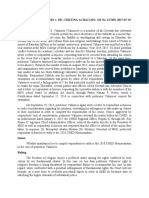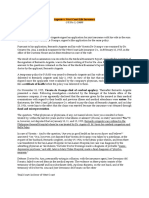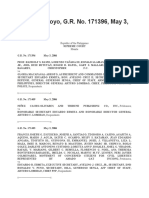People Vs Marte Digested Case
People Vs Marte Digested Case
Uploaded by
nmtalbinCopyright:
Available Formats
People Vs Marte Digested Case
People Vs Marte Digested Case
Uploaded by
nmtalbinOriginal Title
Copyright
Available Formats
Share this document
Did you find this document useful?
Is this content inappropriate?
Copyright:
Available Formats
People Vs Marte Digested Case
People Vs Marte Digested Case
Uploaded by
nmtalbinCopyright:
Available Formats
People vs.
Andre Marti
FACTS:
Appellant informed Anita Reyes that he was sending packages (4 gift
wrapped) to a friend in Zurich, Switzerland. Anita Reyes then asked the
appellant if she could examine and inspect the packages. Appellant,
however, refused, assuring her that the packages simply contained books,
cigars, and gloves and were gifts to his friend in Zurich. Before delivery of
appellant's box to the Bureau of Customs and/or Bureau of Posts, Mr. Job
Reyes (proprietor) and husband of Anita (Reyes), following standard
operating procedure, opened the boxes for final inspection. His curiousity
aroused, he squeezed one of the bundles allegedly containing gloves and felt
dried leaves inside. He made an opening on one of the cellophane wrappers
and took several grams of the contents thereof.
Job Reyes forthwith prepared a letter reporting the shipment to the NBI and
requesting a laboratory examination of the samples he extracted from the
cellophane wrapper. Job Reyes informed the NBI that the rest of the
shipment was still in his office. Therefore, Job Reyes and three (3) NBI
agents, and a photographer, went to the Reyes' office at Ermita, Manila. J
ob Reyes brought out the box in which appellant's packages were placed
and, in the presence of the NBI agents, opened the top flaps, removed the
styro-foam and took out the cellophane wrappers from inside the gloves.
Dried marijuana leaves were found to have been contained inside the
cellophane wrappers. The package which allegedly contained books was
likewise opened by Job Reyes. He discovered that the package contained
bricks or cake-like dried marijuana leaves. The package which allegedly
contained tabacalera cigars was also opened. It turned out that dried
marijuana leaves were neatly stocked underneath the cigars.
The NBI agents made an inventory and took charge of the box and of the
contents thereof, after signing a "Receipt" acknowledging custody of the said
effects.
Appellant contends that the evidence subject of the imputed offense had
been obtained in violation of his constitutional rights against unreasonable
search and seizure.
The evidence were primarily discovered and obtained by a private person,
Job Reyes.
ISSUE: W/N Appellants constitutional rights against unreasonable searches
and seizure were violated?
HELD: We hold in the negative. In the absence of governmental interference,
the liberties guaranteed by the Constitution cannot be invoked against the
State.
The contraband in the case at bar having come into possession of the
Government without the latter transgressing appellant's rights against
unreasonable search and seizure, the Court sees no cogent reason why the
same should not be admitted against him in the prosecution of the offense
charged.
It will be recalled that after Reyes opened the box containing the illicit cargo,
he took samples of the same to the NBI and later summoned the agents to
his place of business. Thereafter, he opened the parcel containing the rest of
the shipment and entrusted the care and custody thereof to the NBI agents.
Clearly, the NBI agents made no search and seizure, much less an illegal
one, contrary to the postulate of accused/appellant
The constitutional proscription against unlawful searches and seizures
therefore applies as a restraint directed only against the government and its
agencies tasked with the enforcement of the law. Thus, it could only be
invoked against the State to whom the restraint against arbitrary and
unreasonable exercise of power is imposed.
If the search is made upon the request of law enforcers, a warrant must
generally be first secured if it is to pass the test of constitutionality.
However, if the search is made at the behest or initiative of the proprietor of
a private establishment for its own and private purposes, as in the case at
bar, and without the intervention of police authorities, the right against
unreasonable search and seizure cannot be invoked for only the act of
private individual, not the law enforcers, is involved. In sum, the protection
against unreasonable searches and seizures cannot be extended to acts
committed by private individuals so as to bring it within the ambit of alleged
unlawful intrusion by the government.
WHEREFORE, the judgment of conviction finding appellant guilty beyond
reasonable doubt of the crime charged is hereby AFFIRMED. No costs.
You might also like
- Report of RCMP Civilian Review and Complaints Commission - Amber TuccaroDocument10 pagesReport of RCMP Civilian Review and Complaints Commission - Amber TuccaroAnonymous V2cSapvbY100% (1)
- People vs. MartiDocument3 pagesPeople vs. MartiCourtney Tirol100% (2)
- Tano Vs SocratesDocument12 pagesTano Vs SocratescharmssatellNo ratings yet
- PEOPLE Vs ANDRE MARTI DigestDocument1 pagePEOPLE Vs ANDRE MARTI DigestJC100% (4)
- 136 ADMU V Capulong (Roxas)Document2 pages136 ADMU V Capulong (Roxas)Trisha Dela RosaNo ratings yet
- Carale vs. AbarintosDocument13 pagesCarale vs. AbarintosRustom IbañezNo ratings yet
- Ali Vs Bubong Digest EaDocument2 pagesAli Vs Bubong Digest EaAndrea Elizze ManuelNo ratings yet
- Marceliano L. Castellano For PetitionerDocument19 pagesMarceliano L. Castellano For PetitionerLien PatrickNo ratings yet
- Republic of The Philippines Supreme Court ManilaDocument4 pagesRepublic of The Philippines Supreme Court ManilaJezra DelfinNo ratings yet
- Atty. D. Dela Cruz ObliconDocument465 pagesAtty. D. Dela Cruz ObliconNon ConformistNo ratings yet
- A.4b St. LouisDocument1 pageA.4b St. LouislorenzdaleNo ratings yet
- ADM. CASE No. 3319 June 8, 2000 LESLIE UI, Complainant, ATTY. IRIS BONIFACIO, Respondent. de Leon, JR., J.Document101 pagesADM. CASE No. 3319 June 8, 2000 LESLIE UI, Complainant, ATTY. IRIS BONIFACIO, Respondent. de Leon, JR., J.Michaela GarciaNo ratings yet
- People vs. Berdida GR No. L-20183 June 30, 1966Document7 pagesPeople vs. Berdida GR No. L-20183 June 30, 1966Christiaan CastilloNo ratings yet
- 31 PEOPLE OF THE PHILIPPINES v. WILLIAM VILLAROS Y CARANTO G.R. No. 228779, October 08, 2018Document2 pages31 PEOPLE OF THE PHILIPPINES v. WILLIAM VILLAROS Y CARANTO G.R. No. 228779, October 08, 2018bernadeth ranolaNo ratings yet
- Landbank Vs AranetaDocument2 pagesLandbank Vs AranetaRenNo ratings yet
- Mercado v. Vitriolo DigestDocument2 pagesMercado v. Vitriolo Digestronnie j engging100% (1)
- Presbitero vs. Atty SolidumDocument2 pagesPresbitero vs. Atty SolidumJzy DSNo ratings yet
- DIGEST Rule 1 No. 8 and Rule 2 No. 2 Republic of The Philippines v. Hon. Jose R. HernandezDocument3 pagesDIGEST Rule 1 No. 8 and Rule 2 No. 2 Republic of The Philippines v. Hon. Jose R. HernandezRomnick JesalvaNo ratings yet
- Agraviador vs. Amparo-Agraviador DigestDocument2 pagesAgraviador vs. Amparo-Agraviador DigestESSU Societas Discipulorum Legis100% (1)
- People v. BelloDocument5 pagesPeople v. BelloNin BANo ratings yet
- Code of Professional ResponsibilityDocument2 pagesCode of Professional ResponsibilityRonnel VivoNo ratings yet
- 20 - People V AlzonaDocument3 pages20 - People V AlzonaJesi CarlosNo ratings yet
- Balmores v. Mindanao State UniversityDocument2 pagesBalmores v. Mindanao State UniversityMarites regaliaNo ratings yet
- Ethics Last CasesDocument17 pagesEthics Last CasesADNo ratings yet
- (A.C. No. 11604, June 07, 2017) MA - CHRISTINA POBRE-HOLGADO V. ATTY. CARMINA AGNES P. PADER-VILLANUEVADocument6 pages(A.C. No. 11604, June 07, 2017) MA - CHRISTINA POBRE-HOLGADO V. ATTY. CARMINA AGNES P. PADER-VILLANUEVAEvelyn TocgongnaNo ratings yet
- Case Name People v. Tadepa Topic Case No. - Date Ponente DoctrineDocument1 pageCase Name People v. Tadepa Topic Case No. - Date Ponente DoctrinePau Ita asNo ratings yet
- Article II. Auto Limitation - Tanada vs. Angara (Case Digest)Document1 pageArticle II. Auto Limitation - Tanada vs. Angara (Case Digest)Ellie HarmonieNo ratings yet
- Basic Legal EthicsDocument5 pagesBasic Legal EthicsClark Lim100% (1)
- In Re Luis B. Tagorda G.R. No. 32329, March 23, 1929Document6 pagesIn Re Luis B. Tagorda G.R. No. 32329, March 23, 1929Adrian SimanganNo ratings yet
- Pacificador V COMELECDocument1 pagePacificador V COMELECDan CarnaceteNo ratings yet
- PEOPLE V Lawas To Nelmida CaseDocument44 pagesPEOPLE V Lawas To Nelmida CasenesliebarramedaNo ratings yet
- Legal Ethics Digests Case 36-40 AndradaDocument10 pagesLegal Ethics Digests Case 36-40 AndradaRaph AndradaNo ratings yet
- Hernandez v. GoDocument4 pagesHernandez v. GoPatch MagtanongNo ratings yet
- Felix Gonzales V - ObliconDocument22 pagesFelix Gonzales V - ObliconGuinevere RaymundoNo ratings yet
- People vs. PanisDocument1 pagePeople vs. PanisAnny YanongNo ratings yet
- A.C. No. L-553 - Mauricio C. Ulep vs. Legal Clinic, IncDocument14 pagesA.C. No. L-553 - Mauricio C. Ulep vs. Legal Clinic, IncApr CelestialNo ratings yet
- Lim Vs MontanoDocument1 pageLim Vs MontanoScribd ManNo ratings yet
- Case Digest - Aldovino Vs ComelecDocument2 pagesCase Digest - Aldovino Vs ComelecJohanna Mae L. AutidaNo ratings yet
- Generality (Estrada V Desierto)Document2 pagesGenerality (Estrada V Desierto)MikkaEllaAnclaNo ratings yet
- Case of AmpuanDocument2 pagesCase of AmpuanJohannalyn SanchezNo ratings yet
- People Vs SantiagoDocument3 pagesPeople Vs SantiagoJhay CarbonelNo ratings yet
- Samaneigo V FerrerDocument2 pagesSamaneigo V FerrerSachuzenNo ratings yet
- Magno Vs Jacoba 2Document4 pagesMagno Vs Jacoba 2Ronald LasinNo ratings yet
- Quiz BowlDocument5 pagesQuiz Bowldualbz04No ratings yet
- Done - 12a. Taroma V Sayo - Alternate To ParedesDocument2 pagesDone - 12a. Taroma V Sayo - Alternate To ParedessophiaNo ratings yet
- Avida Land Corporation Vs Atty. Argosino, A.C. No. 7437, August 17, 2016Document2 pagesAvida Land Corporation Vs Atty. Argosino, A.C. No. 7437, August 17, 2016Danny LabordoNo ratings yet
- Barandon V FerrerDocument3 pagesBarandon V Ferrermangopie00000No ratings yet
- Caltex (Phil.) Inc. v. Philippine Labor Organizations, Caltex ChapterDocument3 pagesCaltex (Phil.) Inc. v. Philippine Labor Organizations, Caltex ChapterClement del Rosario100% (1)
- C & M Timber Corp Vs Alcala - 111088 - June 13, 1997 - J PDFDocument9 pagesC & M Timber Corp Vs Alcala - 111088 - June 13, 1997 - J PDFKaren CapaoNo ratings yet
- Ulep Vs The Legal Clinic DigestDocument2 pagesUlep Vs The Legal Clinic DigestGigiRuizTicarNo ratings yet
- 106 SCRA 591 - Legal Ethics - Gross Immoral Conduct: ISSUE: Whether or Not ManiwangDocument3 pages106 SCRA 591 - Legal Ethics - Gross Immoral Conduct: ISSUE: Whether or Not ManiwangHarold ApostolNo ratings yet
- Canon 12Document4 pagesCanon 128LYN LAWNo ratings yet
- RURAL BANK OF SAN MIGUEL v. MONETARY BOARDDocument2 pagesRURAL BANK OF SAN MIGUEL v. MONETARY BOARDpb Stan accountNo ratings yet
- PALE Digested CasesDocument14 pagesPALE Digested CasesVal Justin DeatrasNo ratings yet
- CATU Vs RellosaDocument3 pagesCATU Vs RellosaVicente AngNo ratings yet
- G.R. No. 160653Document2 pagesG.R. No. 160653Eap BustilloNo ratings yet
- Catu vs. RellosaDocument2 pagesCatu vs. Rellosaejusdem generisNo ratings yet
- 4people Vs MartiDocument13 pages4people Vs MartiRai-chan Junior ÜNo ratings yet
- 15 People v. Marti, G.R. No. 81561, January 18, 1991Document2 pages15 People v. Marti, G.R. No. 81561, January 18, 1991mae ann rodolfoNo ratings yet
- People V MartiDocument5 pagesPeople V MartiYrra LimchocNo ratings yet
- People vs. Andre Marti G.R. No. 81561, January 18, 1991 193 SCRA 57 (1991)Document2 pagesPeople vs. Andre Marti G.R. No. 81561, January 18, 1991 193 SCRA 57 (1991)lennon tapiador100% (1)
- Kapple V OPM Initial DecisionDocument15 pagesKapple V OPM Initial DecisionKen WilliamsNo ratings yet
- (05.G.02.04) Carlos vs. SandovalDocument4 pages(05.G.02.04) Carlos vs. SandovalstrawberrehNo ratings yet
- Argente v. West Coast Life InsuranceDocument2 pagesArgente v. West Coast Life InsuranceJellyn100% (1)
- I T H ' M: N HE ON Ble High Court of AdrasDocument15 pagesI T H ' M: N HE ON Ble High Court of Adrasbhavna khatwaniNo ratings yet
- Labor Relations PresentationDocument16 pagesLabor Relations Presentationburhan_qureshi0% (1)
- People v. AvilaDocument2 pagesPeople v. AvilaErica Mae VistaNo ratings yet
- CORPORATE CRIMINAL LIABILITy NewDocument63 pagesCORPORATE CRIMINAL LIABILITy NewSaahiel SharrmaNo ratings yet
- State of Minnesota District Court County of Ramsey 2nd Judicial DistrictDocument5 pagesState of Minnesota District Court County of Ramsey 2nd Judicial DistrictGoMNNo ratings yet
- Hobby Lobby ComplaintDocument20 pagesHobby Lobby ComplaintJoneceNo ratings yet
- Tia 568 B.1 3Document10 pagesTia 568 B.1 3k1gabitzu9789No ratings yet
- Ong vs. Court of AppealsDocument18 pagesOng vs. Court of AppealsKenneth LimosneroNo ratings yet
- Ker & Co, Ltd. LingadDocument1 pageKer & Co, Ltd. Lingadamareia yapNo ratings yet
- The Philippine RepublicDocument3 pagesThe Philippine Republicdandred gomezNo ratings yet
- Classification of CreditsDocument4 pagesClassification of CreditsMatthew WittNo ratings yet
- Case 1. David v. Macapagal-Arroyo, GR No. 171396, 3 May 2006Document71 pagesCase 1. David v. Macapagal-Arroyo, GR No. 171396, 3 May 2006Bryan delimaNo ratings yet
- Oblicon Feb26Document133 pagesOblicon Feb26Pilacan KarylNo ratings yet
- 01 BSP V Legaspi DigestDocument2 pages01 BSP V Legaspi DigestVernon ChuaNo ratings yet
- 118 Common QSDocument2 pages118 Common QSEmmanuel Jimenez-Bacud, CSE-Professional,BA-MA Pol SciNo ratings yet
- Labor 1 DFA V NLRCDocument1 pageLabor 1 DFA V NLRCRyanNewEraNo ratings yet
- Zamora Vs Su JR 1990Document2 pagesZamora Vs Su JR 1990Ruperto A. Alfafara IIINo ratings yet
- USA Vs Thompson - Stipulated Motion To Continue Trial Date and Pretrial Motions DeadlineDocument9 pagesUSA Vs Thompson - Stipulated Motion To Continue Trial Date and Pretrial Motions DeadlineKING 5 NewsNo ratings yet
- Solanco OrderDocument37 pagesSolanco OrderAlex GeliNo ratings yet
- 2 Lim Tay Vs CADocument19 pages2 Lim Tay Vs CAMark Ebenezer BernardoNo ratings yet
- Understanding The Rizal LawDocument1 pageUnderstanding The Rizal LawFuraida TikingNo ratings yet
- LEGPROF Court VisitDocument2 pagesLEGPROF Court VisitGabriella VenturinaNo ratings yet
- ADITYADocument11 pagesADITYAAditya SinghNo ratings yet
- Acosta Vs SalazarDocument3 pagesAcosta Vs SalazarRichard Francis FloresNo ratings yet
- "Executive Power of The Union and The States": Dr. Ram Manohar Lohiya National Law University, LucknowDocument18 pages"Executive Power of The Union and The States": Dr. Ram Manohar Lohiya National Law University, LucknowShivam KumarNo ratings yet
- Affidavit (Transferee)Document12 pagesAffidavit (Transferee)Deil L. NaveaNo ratings yet

























































































